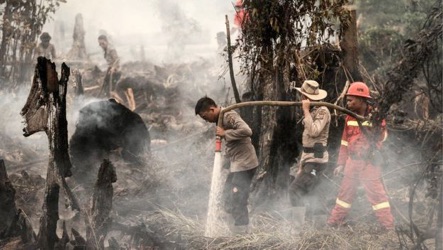News
21 September 2016
100 000 premature deaths in South-East Asia: we are all responsible, but we prefer to look elsewhere
Historically, our societies have often (always?) required an external enemy to give them coherence. The ancient Greeks fought endlessly with the Persians, The Romans were mobilised for centuries against the Barbarians, the “Free World” was unified for decades against communism, and today the “International Community” combats the pseudo islamic state and Bachar Al-Assad in the Near-East. The struggle with an enemy sometimes allows political regimes to survive or even thrive by making national unity against the external enemy, as today in case of the Eritrean regime with Ethiopia. When internal, the enemy can also be used to bring and maintain in power the most abject political forces: nazism against the Jews in the past, and tomorrow, perhaps, racist and xenophobic racist against Muslims. And the press if full nowadays of this combat against the enemy. It is full of stories telling us about horrors perpetrated by today’s enemies: hundreds of thousands of dead in Syria, massacres and rapes in the Near-East, sexual assaults in Germany… In all these cases, people are prompt to find solutions which, often, can be brought down to the elimination of our ennemies by force.
But what about the deaths of which we are responsible? Us? Responsible of deaths? you will say. Impossible! Yet, every year more than 5 million people die from hunger, two-thirds of them children; in other words, 15,000 to 20,000 per day! And we are all responsible: just browse hungerexplained.org if you are not convinced.
But who did mention on the first page of their newspaper or at the very beginning of their radio or television news the 100,000 premature deaths resulting from the fires that occurred last autumn in South-East Asia ? Very few media, if any. Yet, we are responsible of these tens of thousands of deaths that happened in only a few weeks, less than a year ago, but we prefer to look elsewhere.

Indeed, why did these people die? They died because we accept to consume cheap palm oil the production of which caused these huge fires that poisoned millions of people in Asia [read], this very palm oil that is found in a large number of products that we buy every day. They also died to ensure that investors who have put their money in the large companies who produce, process and sell palm oil make profits and redistribute them to their stockholders, including pension funds, our life insurances and other financial products that the richest among us enjoy. Of course, these fires are due to the fact that Indonesia, ranked 88th country out of 168 by Transparency International in 2015 for corruption, does not apply the laws it has promulgated and because large international companies hide their intolerable behaviour that is dangerous for the environment and violate the rights of local communities. But ultimately, it is our blind consumption that is the initial cause without which the system would not exist.
The woman or man who would dare speak out about these issues so far from our daily concerns during forthcoming electoral campaigns (in France, the US or Germany) would be considered by most as “off the mark” and would probably risk political suicide.
Yet, are not the injustices in this world, of which we are at least in part responsible, the root cause of international tensions, extremism, terrorism, wars and international migrations? And the solutions to these issues exist and are in our hands, because we are responsible.
We could easily stop fires in South-East Asia and bring an end to hunger in the world by doing what for us would be just a minor effort. Here are ideals that could mobilise us and mobilise our youth and turn them away from the deadly ideals that are laid before them.
Or do we prefer to continue dealing with problems that we believe, wrongly, can be solved through security measures, wall, fences and wars and avoid to challenge our own guilty behaviour?
————
To know more:
-
-BBC, Indonesia haze may have led to 100,000 premature deaths, says report, 2016
-
-Koplitz et al., Public health impacts of the severe haze in Equatorial Asia in September–October 2015: demonstration of a new framework for informing fire management strategies to reduce downwind smoke exposure, Environmental Research Letters 11 (2016) 094023
Earlier articles on hungerexplained.org related to the topic:
Last update: September 2016
For your comments and reactions: hungerexpl@gmail.com




